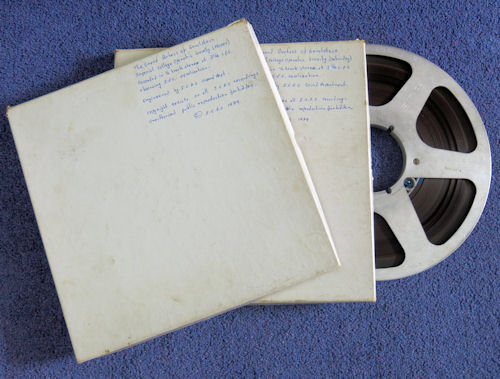

Sam Hallas' Website

Deborah Miles-Johnson, ICOS alumna and Musical Director of IMVC, contacted me to say she'd found two large reels of tapes from the College production of Offenbach's The Grand Duchess of Gerolstein, recorded in 1979. I volunteered my services to transcribe them, thinking this would be as simple as the Mikado tape done previously. [Click the pictures for a larger view, ESC to return]
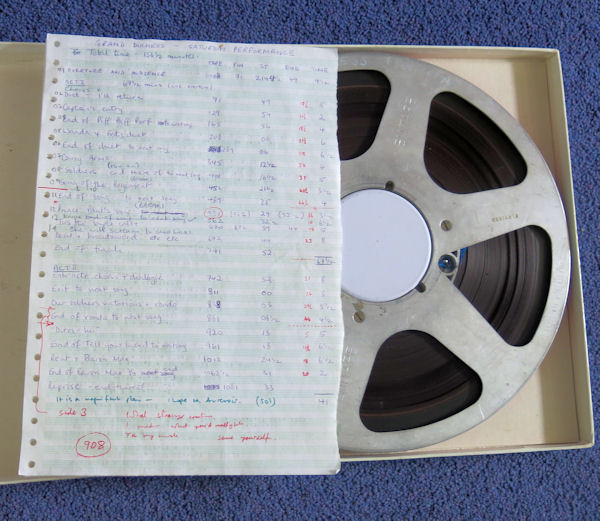
I picked up the tapes in January 2022 from Deborah's house and was pleased to find comprehensive notes on the contents with running order and track length. The two tapes were for the Friday performance and the last night, Saturday. They had been recorded at only 3¾ inches per second - not the best quality recording, but maybe adequate. The claim was that the recordings were ½ track stereo, but see later how they turned out.
Next came the problem of spooling the tape off onto 7 inch reels that were playable on my tape recorder. I had forgotten how tricky it was to get the height between the gramophone turntable and the tape deck right. Experiments with a brick and piles of books found the right combination. I started with the Saturday tape, for no reason other than it was on top. I spooled off what I guessed was Act 1 ready for transcription.
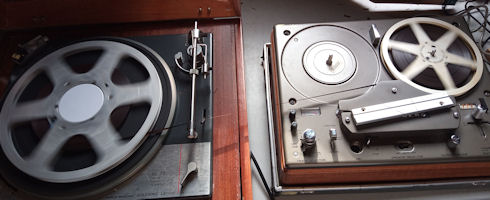
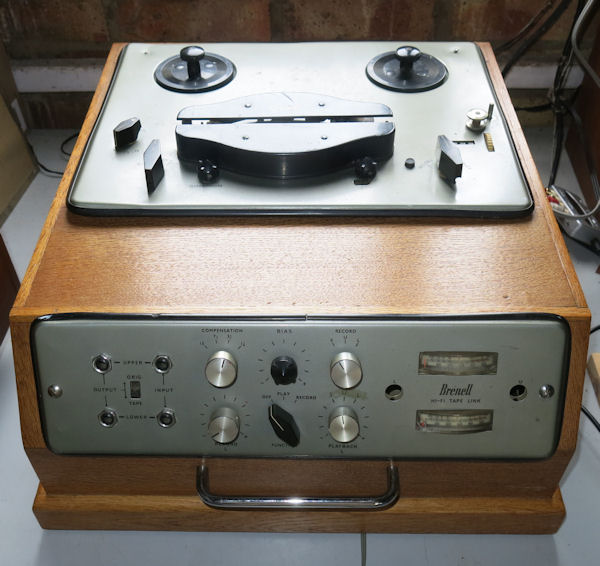
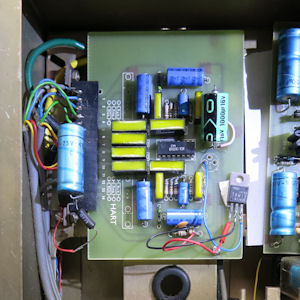
The next problem was my elderly Brenell tape recorder (left). I bought it as a separate tape drive and Hi-Fi tape link in the 1960s. My late father made the oak case to hold the two parts. The Tape Link was originally a valve device, but in the early 1970s I rebuilt it with integrated circuits from a kit design in Wireless World magazine.
By 2022 the tape deck still worked fine but the electronics were showing their age. The replay circuit board (right) was faulty. The usual action with old electronics is to start by replacing all the capacitors - notorious for dying when old. Once the caps were replaced it started working but only on one channel.
I persevered using my Uher Report as playback device with a vintage Tandberg to hold the 7 inch spools. This is where an earlier problem raised it's head. The Mikado tape I transcribed previously suggested that the so-called ½-track recording didn't line up as it should with my ¼-track tape heads. This meant that the right-hand channel was very much quieter than the left-hand channel. I had solved the problem before by playing back on a Fostex 8-track recorder and choosing tracks that gave the best signal. Unfortunately the Fostex has been spirited away by son, Tim, to show his students what tape recording was like in the ancient analogue days. However, I was determined to get some sort of transcription and made a transfer of most of Act 1 in mono using the Tandberg as the playback device playing back only the upper track.
Moving on to spool off Acts 2 and 3 the most serious problem arose. As spooling progressed masses of oxide flew off the tape in the phenomenon known as oxide shedding. This appears to have been prevalent on tapes made in the 1970. I know this because our wedding tape from 1977 disintegrated in a similar fashion, though not before a cassette copy had been made. The coating of metal oxide which holds the recording loses its adhesion to the supporting plastic tape and falls away, taking part of the recording with it. The loss is not necessarily total, but the sound level will fluctuate. In addition, playing the tape will cause further oxide to come off coating the playback head, reducing the sound even further.
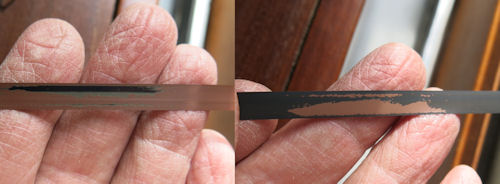
Oxide shedding [click for larger image]
I managed to get some sort of copy of the remainder of the Saturday performance by playing back a track at a time and cleaning the tape head between. The result is mono - better than no result at all.
Yet another problem turned up during the process. In a number of places a loud conclusion to an item was followed by quiet dialogue. The dialogue was partly covered by an echo of the previous crescendo. This is known as print-through, where the magnetic recording from one layer of tape transfers itself to the adjacent layer causing either a pre-echo or a post-echo some seconds earlier or later. It's never happened to any of my own recordings, but is well-known and happened here in a number of places.
It was now time to re-spool the Saturday tape and spool off the Friday tape. From the recording notes I gathered that the original recordings had evidently been made on separate 7 inch reels and had later been spliced together and wound onto the 10½ inch NAB spool. I wonder why.
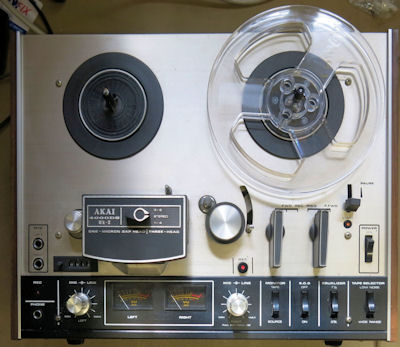
I realised that diagnosing and repairing the old Brenell was going to take more time than I cared to devote to it. So I bit the bullet and bought a second-hand Akai 4000 recorder from eBay. This turned out to be an excellent choice.
In spooling off the Friday tape I could see that it was less damaged than the Saturday one, although there was still some loss of oxide. The end of Act 1 announced itself as I wound the tape by the splice parting company. The splice at the end of Act 2 was harder to find, but nonetheless it was there.
Whilst I was thinking about how to avoid the large difference in sound level between the left and right channels, I had a thought. If I turn the tape over and play the recording it will come out backwards, but the tracks will be slightly differently placed across the tape - possibly to the good. I experimented with the overture and found indeed that the difference between channels was now only about 6dB, which is not too much to correct in editing. The recording software has a single click option to reverse the recording. It then only remains to swap the channels and equalise the levels.
I was able to play all 3 Acts backwards in convenient 10 to 15 minute bursts with pauses to clean the tape head. The later parts of Act 2 and Act 3 suffered from drop-out where oxide was missing but the overall result was better than the Saturday tape. Because I was able to recover both audio channels it now became plain what I had noticed on the Saturday tape that there was no obvious stereo separation, so the result is sadly monophonic. I was also disappointed in the overall sound quality compared with other recordings made by Dramsoc or me.
Play the complete acts by clicking the play button or download the MP3 file by right click and choose 'Save Audio as'. The ZIP files contain separate individual tracks together with a playlist file (m3u format).
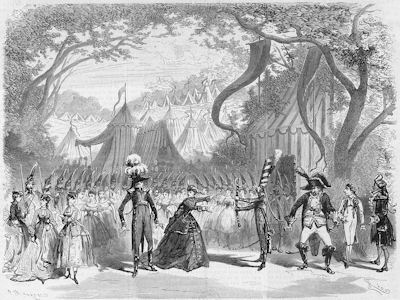
Saturday Act ISaturday Act I Zip File |
Saturday Act IISaturday Act II Zip File |
Saturday Act IIISaturday Act III Zip File |
Friday Act IFriday Act I Zip File |
Friday Act IIFriday Act II Zip File |
Friday Act IIIFriday Act III Zip File |
In April 2024 I received a cassette tape from John Britten of the Sunday charity concert at Budleigh from the 1982 tour of Utopia Ltd. It took pace in St Peter's Church, Budleigh on 1st August 1982. The programme for the concert is shown on the Programmes Page, but the actual contents were slightly different in that the Hebrides Overture (Fingals Cave) was omitted and the Victorian songs were in a slightly different order.
In my research I discovered that Sullivan had not bothered to score an overture to Utopia, so over the years various productions wishing to have something suitable have made their own arrangements of music from the operetta. The musical director for this ICOS production was Ian Assersohn and he composed a splendid overture for the Budleigh production which got a further outing here in St Peter's Church. Ian studied at the Royal College of Music (along the road from IC) and is a respected composer and choral director living in Surrey.
The programme lists "Victorian Songs" without giving their titles. The first one is 'Tenor and Baritone' a humorous duet by H.Broughton Black and H.Lane Wilson, extolling the joys of being either flavour of male singer. The second is 'The dicky bird and the owl' a humorous duet, words by Margaret A. Sinclair, music by Sir Arthur Sullivan. The final one is 'Watchman! What of the Night?' a sentimental ballad by James Sarjeant.
The recording has survived very well. I know the difficulties of recording live performances so appreciate that it was not possible to get as close to the performers as one would desire. However, the orchestral numbers are well modulated so present no problem in transcription. The duets were rather quiet but sound satisfactory when boosted in level.
The files for the 'Concert in St Peter's Church, Budleigh Salterton August 1982' are now on a separate Concerts Page
Concerts Page 1982 Concert
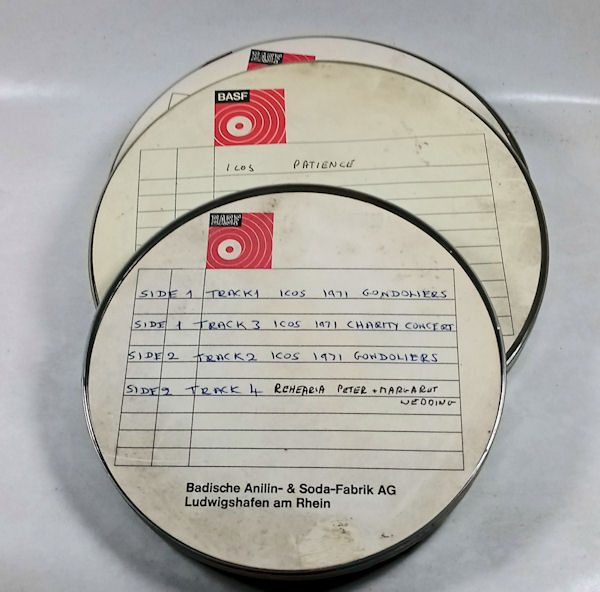
In July 2025 I visited former work colleague and ICOS alumnus, Peter Johnson, who lives near me. He has found some ICOS tapes from 1971 of shows he appeared in. They were the College production of Patience and the Budleigh production of Gondoliers. They were recorded at 3¾ ips in mono. First the transcription of the Gondoliers. Sadly the start of Act 2 was missing most of the first number.
There was also a recording of the charity concert in Budleigh parish church. Most of the track have been identified.
The files for the 'Concert in St Peter's Church, Budleigh Salterton August 1971' are on the separate Concerts Page
Concerts Page 1971 Concert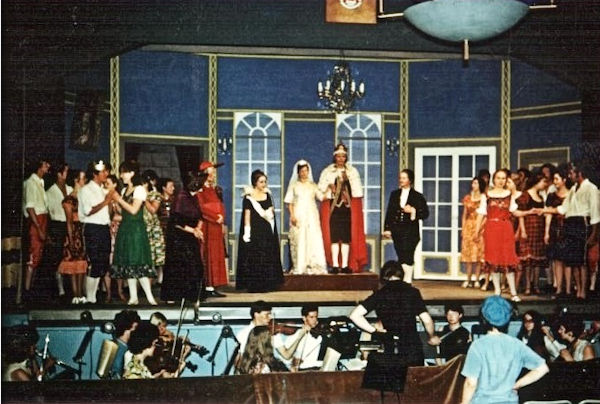
As usual play the tracks by clicking the play button or download the m4a file by right clicking and choose 'Save Audio as'. The zip files contain the individual songs together with a playlist file in m3u format.
1971 Gondoliers Act I |
1971 Gondoliers Act 2 |
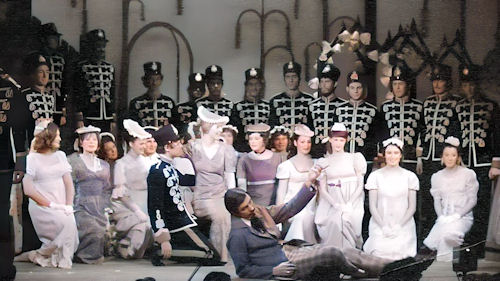
Finally the recording of the production of Patience at College in February 1971.
As usual play the tracks by clicking the play button or download the m4a file by right clicking and choose 'Save Audio as'. The zip files contain the individual songs together with a playlist file in m3u format.
1971 Patience Act 1 |
1971 Patience Act 2 |
Main Page ------ More tapes ------ Programmes Page ------ 50 Years on------ Early Videos